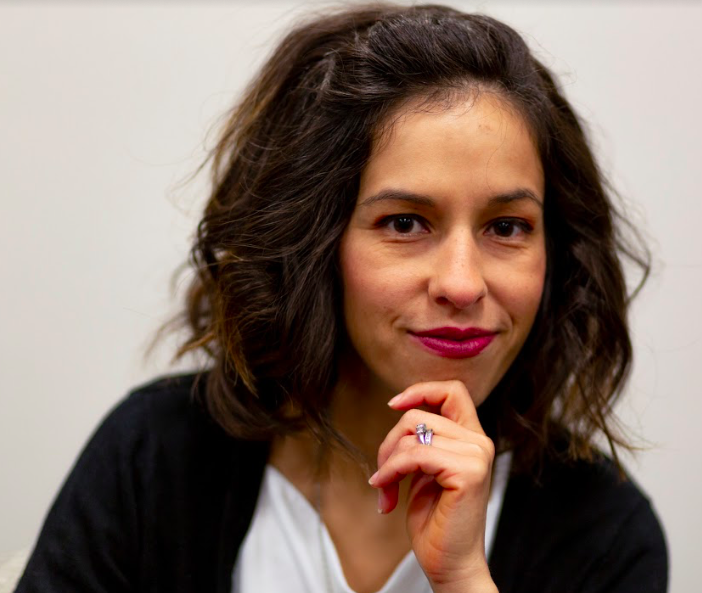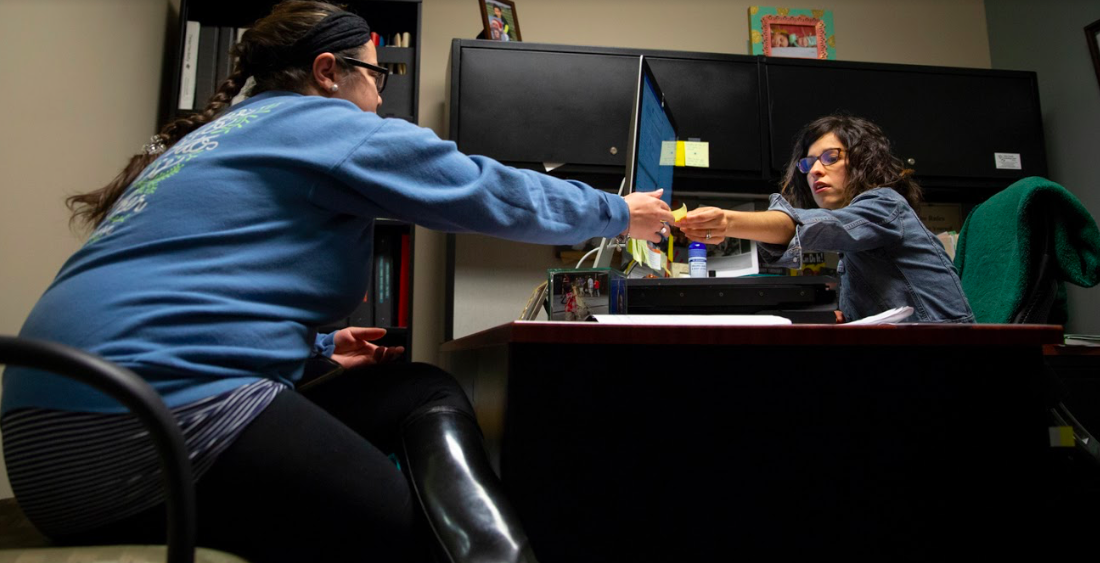Julia Rivas


P.G. & T.M.: ¿Con quién y cuándo emigró?
J.R.: Emigré con mis padres y mi hermano mayor y fue en el año 2000, de El Salvador a New Jersey.
P.G. & T.M: ¿Cómo fue su vida antes de emigrar?
J.R.: Era muy bonita! Tengo muy lindas memorias de mi infancia. Mi papá trabajaba en el transporte público. Era empresario y mantenía su propia tienda de elementos en la casa. Mi hermano y yo íbamos a la escuela y el colegio ... privado. Los dos eran católicos y tienen muy buena representación por tener la mejor calidad de estudio. Los fines de semana siempre íbamos al campo para jugar con mis primos [y] ... los animales. Tenía 13 años, entonces pues ya había pasado mi infancia y todo estaba muy bien hasta ahí. Lamentablemente, mi papá, por ser empresario, comenzó a tener ataques por bandas de delincuentes que aquí se les dice criminales. Les dicen ‘gangs’ criminales porque extorsionan y básicamente les dicen que sí no nos da dinero mensual, le vamos a matar a sus hijos. Pero mi papá decidió que no podía tener esa vida muy insegura, entonces decidió dejar todo, perder todo y mudarnos para Nueva Jersey...comenzar una vida nueva.
P.G. & T.M: ¿Si dejó a alguien ahí cómo le hace sentir?
J.R.: Esa persona es mi tío que íbamos a visitar todos los fines de semana. Yo crecí mirando mi tío como mi segundo papá entonces creo que me dolió dejarlo.
P.G. & T.M: ¿Por qué vino a Bowling Green?
J.R.: No teníamos a nadie de mi familia, nadie en nueva jersey...Mi papá decidió investigar quienes eran las familiares. Y le resultó que mi mamá tenía familiares aquí en Bowling Green.
P.G. & T.M: ¿Cuál fue el mayor obstáculo al venir? ¿cuál fue [el mayor obstáculo] cuando vino?
J.R.: Creo que fue aprender las nuevas culturas cuando uno es joven, uno se aferra mucho a las amistades, no?.. y más grande fui de Nuevo Jersey para acá porque ya tenía 17 años. Había acabado mis clases también y estaba en deportes ... todos los años...tenía mi grupo, ya está acostumbrada para cambiarme así de pronto a una cultura...Me dio depresión y pasé por una depresión horrible porque ...fue difícil volver a comenzar por tercera vez.
P.G. & T.M: ¿Nos puede decir lo que más extraña de su cultura en El Salvador o en Nueva Jersey?
J.R.: Sí... de El Salvador, extraño mucho la comida, pero más las frutas porque como es un país muy tropical...entonces todo el tiempo hay mangos, dulces y agrios etc... De Nueva Jersey lo que extraño es la cultura latina, la música.. la comida de diferentes países.
P.G. & T.M: ¿Cuál es su especialización?
J.R.: Soy coordinadora del programa de maestros. Mi especialidad en este título es reclutar estudiantes para el programa de maestros en WKU.
P.G. & T.M: ¿Por qué eligió perseguir esta carrera?
J.R.: Elegí mi maestría en relaciones estudiantiles; la escogí por eso, porque trabajo en... [la] universidad con estudiantes. Me gusta mucho la energía... construir nuevas cosas - me encanta esta diversidad. Siento que es un lugar donde todos los estudiantes podemos crear proyectos... nuevas investigaciones con minorías.. Me gusta (que) me quedé en esta carrera y tengo ese trabajo para ayudar a minorías a seguir el sueño de obtener una carrera universitaria. Yo como minoría tuve muchos obstáculos en mi carrera educativa y no tuve personas que parecían como yo,... no tuve ejemplos a seguir.
P.G. & T.M: ¿Cree que los derechos humanos son iguales para toda la gente?
J.R.: No, porque como mujer siento que no hay igualdad... en el área laboral. Cómo latina siento que también hay muchos más obstáculos desde que yo hablo con un acento en inglés... siento que la gente me mira mal, no todo el mundo. No hay muchas personas para mí que apoyan....[Hay] ese sentimiento que no tenemos la misma voz que otras personas... [al] ser una minoría en un pueblo que la mayoría son blancos.
P.G. & T.M: ¿Si tuviera la oportunidad para recrear sus propias reglas cuáles serían para tener una sociedad ideal?
J.R.: A mí me encantaría ver en el área, comenzando por el área de la escuela, me encantaría ver maestros afroamericanos, hispanos, asiáticos...Me encantaría ver diversidad... [Hay] grandes obstáculos, entonces me encantaría que más estudiantes de minorías optarán por eso, optaron por ser doctores. Es que si no, igual me encantaría en las agencias del gobierno que hubiera más diversidad, personas que sean bilingües que sean trilingües. Me encantaría que ...[sean] más amables al pensar en más amigables y acogieran a la diversidad que no que tiene este pueblo. Apoyar a más, a los estudiantes, a todos en general. Y que todavía no existiera racismo, que no me sintiera incomoda al encarar un cuarto donde haya sólo blancos ...donde no me miren raro, una sociedad más amorosa más aceptable a la diversidad.
P.G. & T.M.: When and with whom did you emigrate?
J.R.: I emigrated with my parents and brother in the year 2000, from El Salvador to New Jersey.
P.G. & T.M.: How was your life before emigrating?
J.R.: “Very beautiful! I’m very fond of my childhood memories. My father was a businessman; he worked in public transportation and he also had his own store.My brother and I attended a private school. Both schools were Catholic, and have a very good reputation for providing a high quality of education. I have warm memories of my school. On the weekends, we would always go play with our cousins and animals in the country. I was thirteen, so I had already spent my childhood there and all was well up until that point. Around then, unfortunately, my father became another victim of delinquent gangs because of his business. I call them criminal gangs because they would extort money and would threaten that if you didn’t pay them, they would kill your children. For awhile, my father obliged before deciding that he couldn’t go on living in that state. It was then that he decided we were moving to New Jersey to start a new life.”
P.G. & T.M.: Did you have to leave any loved ones behind? If so, how did that feel?
J.R.: I had to leave my uncle who used to visit every weekend. I grew up seeing him as a second father, so it hurt to leave him.
P.G. & T.M.: Why did you come to Bowling Green?
J.R.: We didn’t have any family, we didn’t have anyone in New Jersey...My dad decided to find out if we had any family in the US. It turns out that my mom had family here in Bowling Green.
P.G. & T.M.: What was the biggest challenge you faced when moving here?
J.R.: I believe it was getting accustomed to different cultures as a young girl. Also, as a kid you really hold onto your friendships, right? It was even harder when we moved from New Jersey to here. I was 17, I had finished my classes and I was involved in sports. I had my own friend group. I was accustomed to how things were and then to have to leave that behind and come to another culture… It made me depressed. It was so hard to start again for a third time.
P.G. & T.M.: Can you tell us what you miss the most from your culture in El Salvador or in New Jersey?
J.R.: Yes… from El Salvador, I really miss the food but even more so the fruit. It’s a tropical country, so there are always mangos, sweet and sour… From New Jersey, what I miss the most is the Latino culture, the music...the food from different cultures.
P.G. & T.M.: What is your title?
J.R.: I am a coordinator for the teachers program. I specialize in recruiting students to join this program here at WKU.
P.G. & T.M.: Why did you choose to pursue this career?
J.R.: I have my masters in student relations; I chose this because I love the energy that comes with working with students. I love the diversity. I feel like it’s a place where students can create new projects, new research with minorities. I’m happy that I decided this career and have this job to help minorities follow their dreams and obtain a university career. As a minority I had many obstacles in my educative career y I did not have people that look like me...I did not have examples to follow.
P.G. & T.M.: Do you believe human rights are equal for all people?
J.R.: No, as a woman I feel that there is not equality, especially in the labor field. As a latino woman I feel that I also have many obstacles since I speak with an accent in English...I feel that I am looked at badly, but not by everyone. There aren’t many people that support me…[there is this] feeling of not having the same voice as other people….and being a minority in a city [where the population is] majority white.
P.G. & T.M.: If you had the opportunity to recreate your own rules to have an ideal society, what would they be?
J.R.: I would love to be in the area, starting in the are of the school...I would love to see teachers who are African American, Asian, and Hispanic...I would love to see diversity...so I would love to see more minority students choose to teach or be doctors. And if not, I would love to see them in government agencies where there is a lot of diversity, some bilingual and others trilingual. I would love that...more kind thinking and more friendliness and embracement of diversity. To help students more in general. And to end racism, it makes me uncomfortable to have to face it in a room where there are only white people who look at me strangely, I would like a society more loving and accepting of diversity.
Some of the links on this page may require additional software to view.

